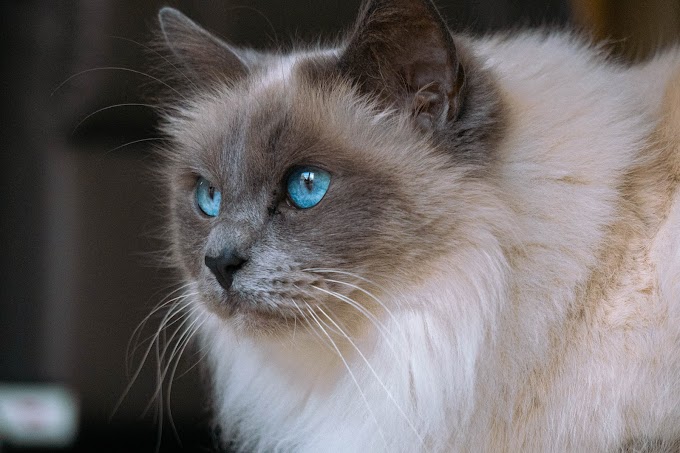The Essential Guide to Ragdoll Cats and Allergies
Before adopting a Ragdoll cat, it's essential to understand their unique traits and potential allergies. These sweet cats are famous for their friendliness, adaptability, and loyalty. Ragdolls, however, can get skin infections, allergies, and mite infestations. These allergies can stem from common factors like fleas, food ingredients, or environmental triggers. Understanding these allergies will help provide the necessary care and support for their well-being.
Ragdoll Cats and Type of Allergies:
Ragdoll cats have different types of allergies. These include skin allergies, inhalant allergies, Environmental allergies, and food and ingredient allergies. Let's look at each allergy and its symptoms in brief detail.
Skin allergies:
Cats with skin allergies often scratch a lot, lose hair, and get irritated skin due to fleas, ticks, certain foods, and things in the environment.
Environmental allergies:
Cats who have allergies to their surroundings may experience breathing problems like asthma, coughing, and sneezing. Dust mites, mold, pet dander, pollen, and dust are commonly known triggers that can provoke these symptoms.
allergies to inhalants:
Ragdoll cats are also susceptible to inhalant allergies. This allergy is often caused by pollutants in the air. It can lead to eye discomfort, respiratory problems, and skin issues. Plants, cleaning agents, perfumes, and other substances are frequently inhaled.
food or ingredient allergies:
Cats typically experience allergic reactions between the ages of 2 to 6. It's important to note that food allergies can trigger a serious and potentially fatal condition known as food anaphylaxis. If you observe any signs of a food allergy or an allergic reaction in your cat, it is advisable to seek veterinary attention promptly.
Signs of Cat Allergies:
Ragdoll cats may exhibit signs of allergies, such as sneezing, coughing, and wheezing. They may also experience discomfort in the form of excessive grooming, scratching, hair loss, skin irritation, rashes, hot spots, vomiting, diarrhea, loss of appetite, swollen paws, runny nose, and watery eyes. If you observe any of these symptoms in your pet companion's behavior or physical condition mentioned above that indicates allergies or discomfort occur promptly.
Managing Ragdoll Cat Allergies: Tips and Advice:
- Firstly, keeping your home clean is paramount.
- Regularly vacuuming your home helps get rid of dander and reduces the possibility of environmental irritants.
- Using dust mite covers for your pillows and bedding is another good way to minimize allergen exposure.
- Bathing your Ragdoll cat once a month helps reduce allergens on their fur. However, it's essential to avoid overdoing it as excessive bathing can cause dry skin.
- To further improve air quality in your home and promote easy breathing for both you and your feline companion, consider using air purifiers.
- Additionally, providing your pet with high-quality allergen-free diet can help prevent food allergies.
In case your Ragdoll cat already experiences food allergies, consult with a veterinarian for recommendations on specific dietary changes.
Ragdoll Cat Allergies Treatment:
Ragdoll cats with allergies should be treated like any other cat with allergies. If your cat shows signs of allergies, take it to the veterinarian. the veterinarian can also prescribe allergy medications or recommend immunotherapy. In severe cases, allergy shots may be necessary to help reduce your cat's allergic reactions. Immunotherapy involves a series of injections designed to increase your cat's immunity to an allergen gradually.
Ragdoll cats may have allergies to dust, mold, and pollen. Selecting the right home remedy is crucial for their health and breathing. Choose remedies that reduce sneezing and promote overall well-being.
- Vitamin E has anti-inflammatory properties and can help with skin irritation from mites and fleas.
- Vitamin C is an antihistamine and antioxidant that reduces allergies in cats. It can boost the immune system.
- A low-allergen diet may be beneficial if your cat experiences allergic reactions to certain foods. In such cases, consider transitioning them to a different food type.
- Additionally, it is crucial to maintain a clean and allergen-free environment for your cat's well-being. If you notice any breathing difficulties in your feline friend, it is essential to have them assessed by an experienced veterinarian who specializes in animal care.
Final take:
Pet lovers often have concerns regarding Ragdoll cats and the allergies that may affect them. They seek to understand how to create a clean and allergy-free environment at home. If you have pets in your household, it is important to ensure proper cleanliness by deep cleaning your home regularly. Alongside, providing them with a suitable diet will contribute to their cleanliness and overall health. It is essential to maintain a clean and fresh air flow as allergies thrive in unclean environments. Therefore, it is crucial not to let such conditions persist within your own home.
Frequently Asked Questions:
Do ragdoll cats make you sneeze?
This question requires input from individuals who have allergies and specifically react to certain breeds. Although Ragdoll cats are not considered hypoallergenic, they tend to shed less than some other cat breeds.
Are ragdoll cats hypoallergenic?
Ragdoll cats do not possess the quality of being hypoallergenic. However, their lack of an undercoat significantly reduces shedding.
%20(1).jpg)
.jpg)
.jpg)

.png)

%20(1).jpg)
%20(1).jpg)
%20(1).jpg)



